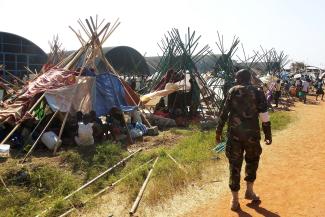News
In brief

Unrest in South Sudan
Shortly before D+C/E+Z went to press, an apparent coup attempt by a former vice president triggered violent clashes in South Sudan. Fighting spread quickly as rival factions of the army attacked each other. President Salva Kiir said the cause was a coup attempt by his long-time rival Riek Machar. Machar denied the allegations. By 19 December the clashes had claimed more than 500 lives. Thousands were displaced from their homes.
Kiir and Machar belong to different ethnic groups, so some consider the conflict to be tribal. There are other views however. In a joint declaration, South Sudan’s clergy stated: "We condemn and correct the media statements and reports that refer to the violence as conflict between the Dinka and Nuer tribes." In this perspective, the root cause was political differences among the ruling party, the Sudan People’s Liberation Movement (SPLM). South Sudan is a very poor country, marked by decades of civil war and a lack of basic infrastructure. Thanks to a peace agreement with – and independence from – Sudan, the capital city of Juba had witnessed fast growth (see essay on page 38 ff.). (my)
A great leaderNelson Mandela was a great leader and a remarkable freedom fighter. The strongest proof of his unmatched global standing may be who spoke at the memorial service that was held in his honour in Johannesburg in December. The masses assembled in Soccer City stadium were addressed by the presidents of the United States of America, Brazil, Namibia, India and Cuba as well as the vice-president of China. Ban Ki-moon, the secretary-general of the United Nations, and Nkosazana Dlamini-Zuma, the chair of the AU Commission, also payed homage to South Africa’s first black president.
The heads of state and government from many other nations attended the service. However, no politician from Europe was invited to take the stage.
While world leaders honoured Mandela, thousands of South Africans in the stadium chose to boo Jacob Zuma, their current president. Their behaviour showed that freedom of expression has indeed become the norm in South Africa. Mandela’s party, the African National Congress, is obviously not beyond criticism.
In the eyes of the world, however, current domestic squabbles in Mandela’s country hardly overshadow the achievements of his "long walk to freedom", to quote the title of the autobiography he wrote before becoming president. In spite of having suffered severe hardship in long years of imprisonment, Madiba, as he was called, strived for reconciliation.
In his lifetime, he had become an international icon for freedom, peace and equality. Barack Obama was right to thank South Africa for sharing this great leader with the world. (dem)
New BMZ leadership
Gerd Müller is Germany’s new federal minister for economic cooperation and development. The member of the CSU (the Bavarian Christian Social Union) previously served as parliamentary state secretary at the Federal Ministry for Food, Agriculture and Consumer Issues. In this role, he dealt with world trade, global food security and related matters. The coalition agreement of CSU, Christian Democratic Union (CDU) and Germany’s Social-democratic Party (SPD) basically confirms previous policy. The relevance of rural issues is emphasised however. In regard to the provision of global public goods, the new government intends to cooperate with emerging markets which, in German eyes, have enough resources at hand domestically to fight poverty. Hans-Joachim Fuchtel (CDU) and Christian Schmidt (CSU) were newly appointed parliamentary state secretaries at the Federal Ministry for Economic Cooperation and Development (BMZ). Hans-Jürgen Beerfeltz, the previous state secretary, remains in office. (dem)
ICC eases pressure on Kenyatta a little bit
The state parties to the International Criminal Court (ICC) decided in late November that accused persons may stay away from individual court session or participate by video link, provided their applications for such exceptions from standard procedure are accepted by the court. The state parties thus did not approve blanket exceptions for sitting heads of state and government to be absent while their cases are heard. African leaders had demanded such exceptions. The reason is that Kenya’s President Uhuru Kenyatta must face trial in The Hague because he is accused of involvement in the post-election violence that rocked his country six years ago. Our December edition, included Kai Ambos’ in-depth assessment of the matter (see D+C/E+Z 2013/12, p. 465 ff.). (dem)
Biofuels fallacy
The EU subsidises biofuels that are produced from oilseeds, sugar and grains. According to a recent publication by Heinrich Böll Foundation and Oxfam Germany, this policy contributes to high food prices internationally, but does not serve climate protection in any efficient way. The authors argue that the land used for biofuel plantations would otherwise serve food production. If it were not for the European subsidies, the global price index for oil seeds would be 16 % lower, the paper points out. Oilseeds would be cheaper by 10 % and grains would also cost less.
The authors disagree with those who consider biofuels a contribution to climate protection. They argue that the intensification of agriculture for the purpose of producing fuels causes green-house gas emissions. On balance, bioethanol is therefore said to be only marginally more climate-friendly than fossil fuels. However, this approach is not cost-efficient, according to the publication. The experts argue that it would make more sense for the EU to support energy efficiency and renewable power generation. (fm)
Biofuels: Effects on global agricultural prices and climate change







